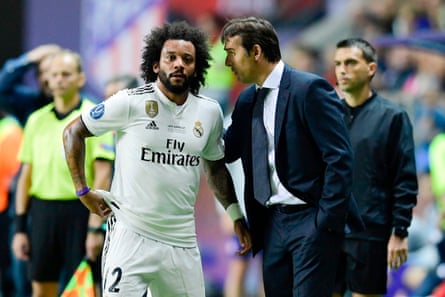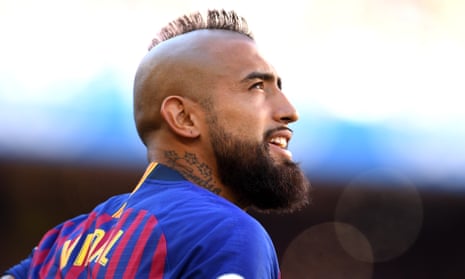On 16 May Barcelona met Mamelodi Sundowns in a friendly in Johannesburg. The Mandela Centenary Cup was the prize, Barcelona beat South Africa’s champions 3-1 and the highlight for the crowd at Soccer City was seeing Lionel Messi come off the bench in the second half.
Taken in isolation, it sounds like a pleasant evening. Yet the wider context was that Barcelona were playing a meaningless game on a different continent three days after their hopes of becoming the first Spanish club to complete an unbeaten campaign in 86 years had gone up in smoke. They had lost their penultimate fixture 5-4 to Levante after resting Messi and, although Ernesto Valverde’s side had earned the right to put their feet up after sealing the title with four games to spare, accepting the invitation from Sundowns while the season was still going ran the risk of leaving La Liga in the shade.
That feeling persists because of the sense that winning the league is no longer enough for the super clubs, even when they achieve domestic dominance. Barcelona swept to a seventh title in 10 years last season, finishing 14 points clear of Atlético Madrid, but the mood could not be entirely celebratory because Roma humiliated them in their Champions League quarter-final. They also had to share the limelight with Real Madrid who closed out an otherwise unremarkable campaign by collecting their 13th European Cup with victory over Liverpool in Kiev.
Next to Madrid’s Champions League expertise, Barcelona’s consistency over 38 games can seem mundane. But this is the consequence when intensity dips at the top. Without a proper title race, La Liga’s top-heavy nature becomes more pronounced, breeding apathy, and that makes it imperative for the teams from the capital to pick up the pace when the new season begins this weekend.
Inevitably Madrid are the natural threat to Barcelona, although the European champions have to adjust after a dizzying summer which featured Zinedine Zidane quitting as manager, Julen Lopetegui pitching up at the Bernabéu after being fired as Spain’s coach on the eve of the World Cup and Cristiano Ronaldo moving to Juventus.
It was Lopetegui’s misfortune to arrive at the Bernabéu just as Ronaldo made his exit. Not only has he replaced the managerial novice who led Madrid to three successive European Cups, he will have to find a way to improve on Zidane’s work without one of the greatest goalscorers of all time.

Lopetegui has joined the most unforgiving club in the world and lost a player who scored 451 goals, including 44 hat-tricks, and won four European Cups, two league titles, two Copa del Reys and three Club World Cups in nine seasons with Madrid.
How to fill that void? The simplest answer, it seems, is by doing nothing. For while Madrid have finally prised Thibaut Courtois away from Chelsea, signing the Belgium goalkeeper for £35m, they have not strengthened up front. Kylian Mbappé and Neymar were out of reach at Paris Saint-Germain and Chelsea are determined to keep Eden Hazard, meaning Ronaldo’s departure has given Gareth Bale the chance to become Lopetegui’s main man.
It was Bale who turned the Champions League final in Madrid’s favour after coming off the bench to score that overhead kick. He later made it 3-1 through a Loris Karius error but afterwards he cast doubt over his future, explaining he was unhappy not to be in Zidane’s first XI.
Now the 29-year-old has a chance to remind Madrid why they paid £86m for him five years ago. The main challenge for Bale will be staying fit, while Madrid will also need even more from Karim Benzema and Isco.
Lopetegui, meanwhile, will relish the chance to develop Marco Asensio and Lucas Vazquez, both of whom featured in his Spain squad. The manager will also need to be patient with Vinícius Júnior after the 18-year-old Brazilian forward’s £40m move from Flamengo.
Another player who stayed put is Antoine Griezmann, who remained at Atlético after resisting the lure of Barcelona. The France striker should form a potent partnership with Diego Costa, with Nikola Kalinic an able deputy, and there is a sense of vitality about Diego Simeone’s team before their second season in the Wanda Metropolitano.
The Europa League winners rebuffed United’s attempt to sign Diego Godin. Antonio Adan will provide cover for Jan Oblak in goal and Nehuén Pérez will add competition for places in a tough defence. Rodri, who was discarded by Atlético as a youngster, has returned from Villarreal to add steel in midfield and Simeone has enhanced his creative options by signing Thomas Lemar for £52.7m from Monaco and Gelson Martins on a free from Sporting Lisbon.
Griezmann should enjoy linking up with Lemar, a former target for Arsenal and Liverpool, and Atlético looked robust in their 4-2 victory over Madrid in the Uefa Super Cup on Wednesday, with Costa scoring twice and the excellent Saúl Níguez stealing the show with a sensational goal in extra time.

“With the cojones that we have, we can fight against any team,” Costa said, underlining Atlético’s ability to defy the odds time and again. Simeone’s gnarly side will be formidable again and are best placed to break up the Barça-Madrid duopoly.
Success for Valencia, who started impressively last season, is likely to mean staying in the top four at the expense of Real Betis, Sevilla and Villarreal.
For all that their challengers are rebuilding, however, Barcelona are the team to beat. They shifted some of the dead wood when they sold Lucas Digne and Yerry Mina to Everton, bolstered their defence by signing Clément Lenglet from Sevilla, rejuvenated their midfield with the signings of the experienced Arturo Vidal from Bayern Munich and the graceful Arthur from Gremio, and controversially muscled in on Roma’s deal to sign the Brazilian winger Malcom from Bordeaux.
Even if a move for Paul Pogba seems fanciful at the moment, it is fair to say that Barcelona have recovered from losing Neymar last year. Philippe Coutinho has had half a season to prepare for the responsibility of replacing Andrés Iniesta, Ousmane Dembélé looks ready after scoring a brilliant goal in the Super Cup victory over Sevilla and most importantly the best footballer in the world still plays in Spain.
For all the new faces, Messi is still the one who makes the difference and, without Ronaldo standing in their way, Barcelona could find themselves on the phone to Sundowns again next May.

Comments (…)
Sign in or create your Guardian account to join the discussion